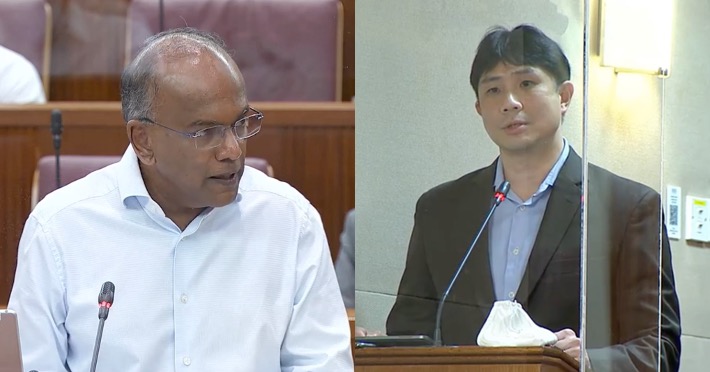It started with a question in Parliament.
Jamus Lim of the Workers' Party asked if the government would consider expanding Yellow Ribbon Project to cover ex-offenders for non-violent crimes.
Contingent on an extended period of good behaviour following successful reintegration in society, they could be eligible for the elimination of their criminal history from public records, for employment purposes.
In a written response on Feb. 2, Minister for Home Affairs and Law K Shanmugam asked Lim what he meant by "non-violent" crime, adding:
"There are many offences which are serious but not violent in nature, such as sexual grooming, outrage of modesty, criminal breach of trust, and theft in dwelling."
Shanmugam said that it could mean records of such offences would be expunged, and they could work in roles such as "security officers" and "pre-school teachers" without employers being aware of their histories.
He said the government operates a framework, which is constantly refined, to rehabilitate and find employment for most offenders in a safe and transparent manner, and invited Lim to make a more "detailed" suggestion.
Case of molest
Shanmugam used a recent court case to illustrate his point.
In a Facebook post on Feb. 4, Shanmugam referred to a case where a British national pleaded guilty to molesting a three-year-old girl during a lesson at a language training and literacy centre. Shanmugam said:
"If the MP’s suggestion is taken up, it means that this man can continue to work with children without employers being informed of his record. Would Singaporean parents be comfortable with this?"
Shanmugam gave another example of an offender convicted of housebreaking employed as a security guard at a condominium, and said such an approach "may not be wise."
He added that the government’s approach is to help offenders rehabilitate, find jobs, and they have to be given second chances. But this is done in a "transparent manner".
Jamus Lim's response
Lim responded on Feb. 5, also on Facebook.
He said he was thinking of residents who had applied for security jobs such as at a shopping mall, but were ruled out due to offences in their youth, such as glue-sniffing or petty theft.
While there is an "obvious risk" from allowing a recalcitrant offender to take on jobs where they could pose a danger, there is also a risk that "permanent labels" on ex-offenders could jeopardise their re-integration into society.
Lim said he asked the question to start a conversation on crime and rehabilitation, not to propose a comprehensive policy in just one sentence.
Instead, he wanted to understand the nuances of the current policy, and ask if there is room to expand the scope of the existing programme. Added Lim:
"Admittedly, there may need to be certain exceptions; for example, those convicted of sex crimes should not work with children as suggested by the Minister, or substance abuse with pharmaceuticals, or drunk driving with transport. I am certain that additional conditions, such as these, would be of value, and should be considered by the Ministry."
Shanmugam's second Facebook comment on re-offenders
Shanmugam subsequently said on Feb. 5 that recidivism, the tendency to reoffend after release, is at an all-time low.
He said that this is because the Prisons and Yellow Ribbon Singapore place strong emphasis on rehabilitation and reintegration into the community.
Top image from CNA Video.
